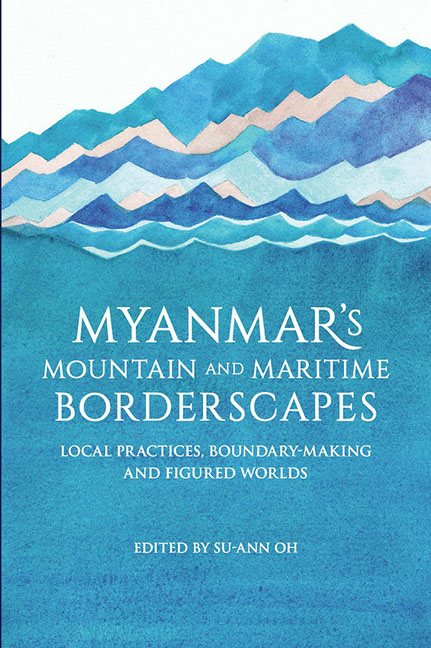Book contents
- Frontmatter
- Contents
- List of Tables
- List of Figures
- Acknowledgements
- Notes on Language, Terminology and Geographical Names
- Contributors
- Abbreviations
- 1 Introduction
- I Overview of Myanmar's Mountain and Maritime Borderscapes
- II Territorial Claims and Imagined Boundaries
- III Social Organization and Border Economies
- IV Mobile Practices and Moving Borders
- 9 The Spatiality and Borderless-ness of Contentious Politics: Kachin Mobilities as Capability
- 10 The Mule Caravans as Cross-Border Networks: Local Bands and their Stretch on the Frontier between Yunnan and Burma
- V Identity Construction and the Politics of Belonging
- VI Institutionalized Identity and Border Practices
- Index
9 - The Spatiality and Borderless-ness of Contentious Politics: Kachin Mobilities as Capability
from IV - Mobile Practices and Moving Borders
Published online by Cambridge University Press: 06 June 2017
- Frontmatter
- Contents
- List of Tables
- List of Figures
- Acknowledgements
- Notes on Language, Terminology and Geographical Names
- Contributors
- Abbreviations
- 1 Introduction
- I Overview of Myanmar's Mountain and Maritime Borderscapes
- II Territorial Claims and Imagined Boundaries
- III Social Organization and Border Economies
- IV Mobile Practices and Moving Borders
- 9 The Spatiality and Borderless-ness of Contentious Politics: Kachin Mobilities as Capability
- 10 The Mule Caravans as Cross-Border Networks: Local Bands and their Stretch on the Frontier between Yunnan and Burma
- V Identity Construction and the Politics of Belonging
- VI Institutionalized Identity and Border Practices
- Index
Summary
INTRODUCTION: CONTENTIOUS POLITICS AND RELEVANCE OF SPATIALITY
While a wider spatial turn in social sciences is datable to the 1980s, transforming many areas of social and economic scholarship, the research on social movements and contentious politics has until recently remained largely aspatial, focusing on identity, grievances, political opportunities and resources (Martin and Miller 2003; Tilly 2000). It is most explicit in Myanmar where the complex decades-long ethnic-based armed struggle for autonomy has been coined ubiquitously as an “ethnic issue”, “ethnic problem” or “ethnic politics” by both the national and international community, including politicians, media, representatives of various groups and organizations, and also by academics. While the geo-body of Myanmar is known to be fiercely contested by a plethora of stakeholders since its establishment in 1948, with all projects and struggles by all contestants concerned with the spatial and institutional organization of political rule, “ethnic” foregrounds and thus exaggerates the role of ethnicity and ethnic markers, and fully eliminates the “spatial” as the point of contention. However, territorial autonomy — seen as involving local authority over ethnic homelands and natural resources, with the rights to farm, engage peacefully in community life, speak the mother tongue, or enjoy a clean environment — lies at the heart of the ongoing peace negotiations between the Kachin Independence Organization (KIO) and the government. It is the only accepted political solution for lasting peace, thus making the “spatial” fully relevant.
Thus the lens of contentious place-bound politics, of an intricate assemblage of places and persons connected through shared ideas and networked arrangements as “…engaged in a complex set of political mobilisations at one point in time,” provides a perspective in this chapter that enables the incorporation of more subtleties and shades than the analysis of politics, ethnicity or territory and borders alone (Allen and Cochrane 2007, p. 1171).
The problematic issue is that contention in politics — a phenomenon of organized social resistance to hegemonic norms — is used to refer to social movements, rebellions, protests and various other activism described as “non-formal” or non-state (see Tilly 2000; McAdam et al. 2001; Martin and Miller 2003).
- Type
- Chapter
- Information
- Myanmar's Mountain and Maritime BorderscapesLocal Practices, Boundary-Making and Figured Worlds, pp. 215 - 236Publisher: ISEAS–Yusof Ishak InstitutePrint publication year: 2016

